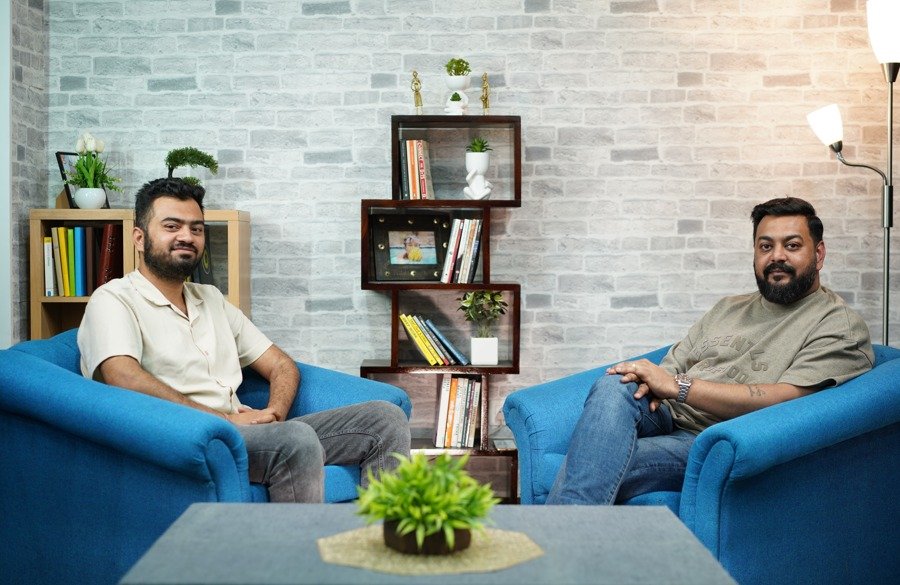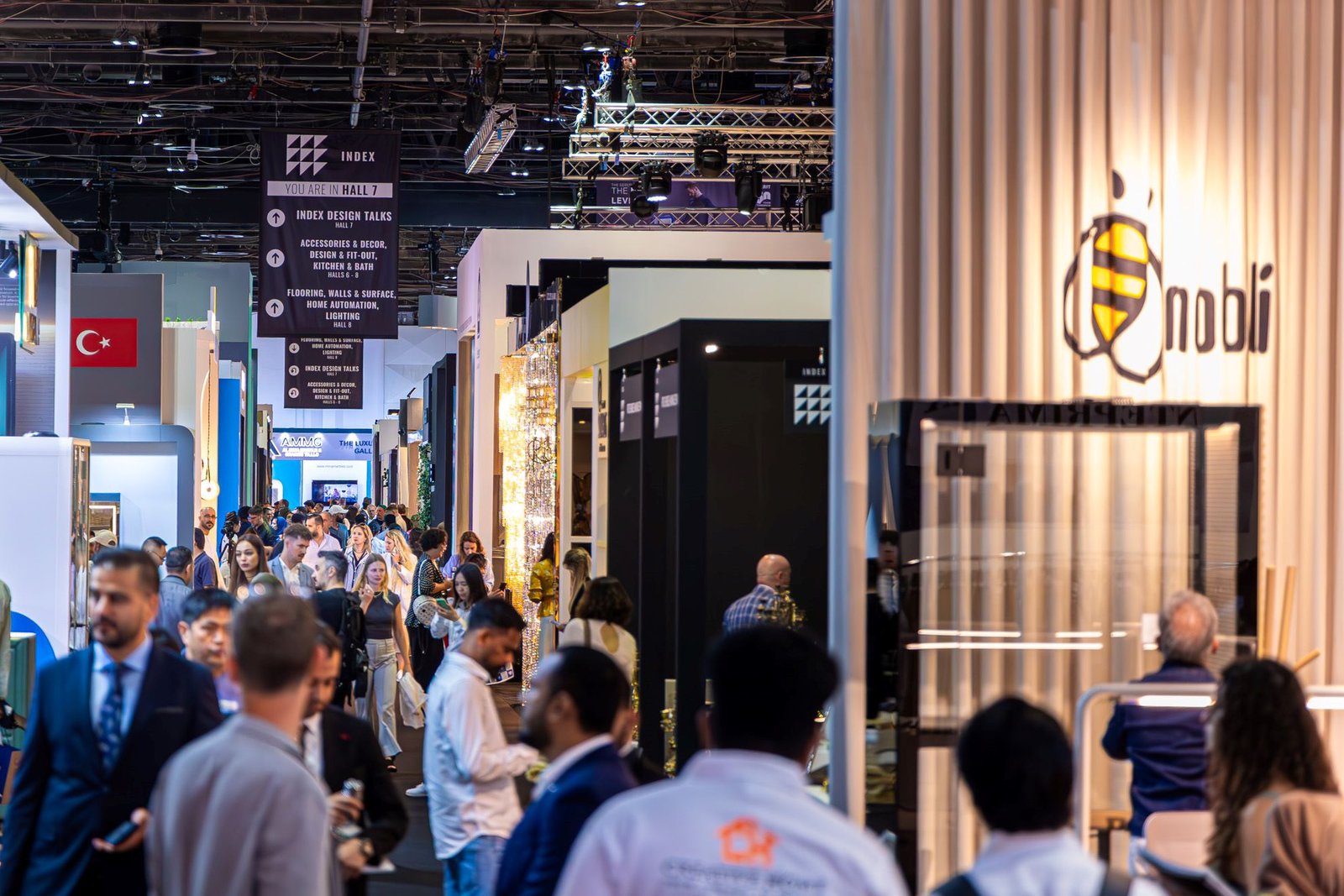Dubai, UAE, 5 June 2024: The second day of this year’s INDEX, the Middle East’s leading event for interior designers, retailers, and fit-out contractors, saw visitors treated to a slew of engaging panel sessions as thousands of international industry professionals filled Dubai World Trade Centre seeking new business opportunities and insights into the latest topics and trends.
The opening panel on the INDEX Design Talks stage looked at how entrepreneurism can give someone freedom, with the caveat that finding the right business partner is crucial to sustained success. Kristian Stinson, who started his interior design and branding agency FINCH with wife Emma, echoed this sentiment. For Stinson, he looks after the financials, giving his partner the freedom to be as creative as possible without feeling the weight of “keeping on the lights” on her shoulders.
“When we started our business, we agreed I would look after the financial side and Emma would focus on the creative aspects without worrying about if the next paycheck is coming or not – it works really well for us,” he said. “Also, we didn’t have that large agency background or a large portfolio of work to lean on. We reached out to some of our old clients and asked if we could use their case studies, which they agreed to. However, we ended up getting sued by our former employer, so we were back to square one.”
Stinson, who said about 70 per cent of the stuff FINCH design never gets released, added: “We now have 22 employees, and when you start to build a roster of really great clients and they say we have a small job, can you do it, it’s a balancing act where if you say no, you are potentially opening the door for someone else. We have to make tough decisions regularly; I run the business pretty much on, so have a target to hit. I sign what I can to hit that target per month, and then I make qualifying decisions after that.”
Elsewhere at today’s Workspace Summit, Pallavi Dean, the award-winning architect, sustainability specialist, and CEO of Roar, delivered a compelling keynote address, exploring the dynamic changes in the workspace industry and underscoring the increasing necessity of psychological expertise in organizational design.
Dean explained psychology is foundational to effective design and critiqued the common business focus on return on investment, arguing such an approach often overlooks the crucial role of proximity. Congested workspaces can lead to environments similar to social housing, which foster vandalism and reduce productivity.

“One theory I strongly advocate for is the Social Facilitation Theory,” she said. “Studies show that an individual’s performance improves when they are in spaces that foster communication and connection. I believe every designer should prioritize three factors; autonomy, a sense of belonging, and the principles of social facilitation theory.”
Dean illustrated the practical relevance of these concepts in workspace design. She suggested creating a variety of spaces within a corporate environment, such as communal booth-style areas, private seating under staircases, and stand-up spaces. Additionally, elements such as acoustic curtains in open seating areas can offer both socializing opportunities and privacy, catering to diverse personality types.
Recognizing the mixed nature of office employees — introverts and extroverts — Dean stressed the importance of accommodating all types of clients. She noted some clients may seek culturally resonant designs that encourage a sense of belonging, while others might prefer the vibe of a metropolitan office, such as those in New York City.
Dean also highlighted the significant impact of ceiling height on interior psychology. Referencing “Creativity Inc” by the CEO of Pixar, she recalled the emphasis on 10-foot-high ceilings to promote creativity. Reflecting on it, she compared how her commercial space was only 2.6 metres and knew what needed to be changed. She recounted how discovering a warehouse with ample space inspired her to design a three-tiered workspace. This new design, featuring acoustic privacy and an open plan, improved the work environment substantially.
“A research study showed that profitability can increase by 30 per cent with high ceilings,” she concluded. “My own design space has already seen a 20 per cent increase.”
Experts also gathered to explore how technology is transforming the way we design and experience interior spaces, sharing their insights on the role of AI, automation, and data in the future of interior design. The panel discussion highlighted the potential of technology to streamline workflows, enhance creativity, and improve project delivery times. One of the key takeaways was the ability of AI to automate repetitive tasks, freeing up designers to focus on the strategic and creative aspects of their work.
“Technology has always been here to assist,” said Mohammed Adib, Founder of INTERCON. “It’s about reducing errors, making things faster, and controlling changes. Now, AI is a much bigger step because the tasks we are automating are making it much simpler for us to develop the stages of design.”
Adib cited an example of his company using AI-generated programs to streamline the coordination of 3D BIM models, a process that previously took two team members five days. This automation allows designers to focus on the bigger picture and enhance the overall quality of the final project. The power of AI to accelerate design processes was further evident by the INDEX Design Talks Stage itself, which was designed by KART Group.
Mustafa Khamash, Managing Director of KART Group, said AI is enabling designers to create more realistic renderings in less time, which translates to a smoother client experience as designers can present a clearer vision from the outset. He explained: “This entire stage here, from concept to completion, took only 10 days. The AI tools not only accelerated the process, but helped us achieve an artistic, functional, and Instagrammable design.”
The panel also explored the ethical considerations surrounding AI use in design, particularly regarding copyright infringement and data privacy. Rakan Aljandali, Design Principal and Creative Director at KCA International, emphasized the importance of copyright protection when using AI tools to generate creative assets. “Data privacy and security will always be critical concerns,” added Aljandali. “It’s our ethical responsibility to ensure that we use these tools responsibly and don’t misuse data.”
Author Profile
Latest entries
 Doing business3 June 2025India’s Q-Commerce Growth Underscores Market-Driven Innovation: Siddharth Shankar
Doing business3 June 2025India’s Q-Commerce Growth Underscores Market-Driven Innovation: Siddharth Shankar Business15 May 2025World MSME Day: A Global Commemoration of Entrepreneurial Vitality
Business15 May 2025World MSME Day: A Global Commemoration of Entrepreneurial VitalityBusiness29 April 2025Russia and UAE Near Historic Free Trade Zone Agreement: A Boost for SMEs
News27 February 2025India and EU Strengthen Science and Technology Ties with High-Level Delegation Meeting















